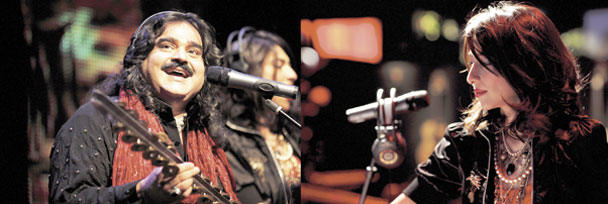| 
Dum
ghutkoon jugni ji, sing Arif Lohar and Meesha Shafi, and you canÕt
help but tap your feet. Long after listening to the song, you inadvertently
hum bits and parts of it. Coke StudioÕs spectacular collaboration
this year, coupling Arif Lohars larger than life folk singing with
Meesha Shafis powerhouse vocals, is unarguably one of this years
most popular songs. The music, in true Coke Studio tradition, is
ethnic yet modern, classic folk yet funk with Arif Lohars traditional
chimta (tongs) chiming companionably alongside Gumbys reverberating
drums.
Then again, the music in Coke Studio is always great what with some
of Pakistans most prolific musicians included in the house band.
What makes Alif Allah really work is the unlikely pairing of Meesha
and Arif. The two vocalists are worlds apart, from their backgrounds
to their singing styles to their career graphs. He is the descendant
of folk singer Alam Lohar and considers it his duty to continue
his familys legacy. Arif has the looks of the quintessential Lollywood
hero, a penchant for vividly colored dhotis and kurtas and aside
from his musical career, has starred in about 45 Punjabi movies.
He has the candor of a jovial Punjabi munda but once he begins to
perform, his inimitable style leaves you spellbound. The deep timbre
of his voice is famous; with its precipitous highs and gentle lows,
accompanied always with the skilful clanking of the chimta and a
shake now and then of his curly locks. Folk musicians are born,
they canot be trained, he says. These lok geet and the messages
they impart are part of my heritage.
Meesha, on the other hand, has stepped into the foray of folk singing
for the first time with Coke Studio. Hitherto, she had been known
for her work as a model and as vocalist to the percussion-based
band Overload. While Overload does delve into mixing eastern and
western music elements, her work with the band is very different
from both her Coke Studio performances, be it Alif Allah or her
solo rendition of Reshmas Chori Chori. Every year, there is one
artiste in Coke Studio who shines brighter than the rest of the
entourage. In 2008, Ali Zafar took centre stage and last year, it
was Ali Hamza. Meesha Shafi is definitely one of the highlights
of season three.
Alif Allah also owes its popularity to its folk background. Here
in Pakistan, music may evolve manifold but the beats and melodies
of folk songs are so familiar to us that they are almost part of
our bloodstream. These are anthems that echo the haunting beats
of our land, that chronicle stories of lovelorn Ranjhas and Heers,
that resonate the drizzle of a rain shower or describe the
devotional, fervent passion of a Sufi saint. This is the music of
our forefathers, songs that are part of our heritage, tunes that
speak volumes in every nuance. It is no wonder then that nothing
strikes a chord as effectively as a folk tune. This is part of the
magic wielded by Alif AllahÕ Ð most of it is a spin-off
from the age-old JugniÕ while bits from different folk tunes
have also been merged in.
I didnot find Alif Allah difficult to sing at all, reveals Meesha.
Chori Chori was a bit intimidating, but singing with Arif Lohar
was fun. The beat of Alif Allah resembles Jugni, a song Iove heard
my whole life and the lyrics are in Punjabi, again a language that
I have grown up with.
Incidentally, it was Meesha who persuaded Rohail Hyatt to let her
sing with Arif. Rohail was considering different vocal collaborations
for the song and Meesha convinced him that she would be just right.
ÒRohail is very open to different ideas and he thought that
a duet between Arif and me had potential, she recalls. I have always
admired Arif Lohar. I love the timbre of his voice, his performing
flair and his unique individuality. Once it had been decided that
I would be singing along with him, I listened to a rough cut he
had already recorded of Alif Allah and took it from there.
Though Meesha may have found it easy, holding her ground before
an artiste as experienced as Arif Lohar is an impressive feat. On
the other hand, Meesha Shafi has a flair for standing out. In Overload,
she is the only female in an all-boy band. No soft, romantic love
songs for her, a la most Pakistani female vocalists. Meesha sings
alongside a group that claims to be Pakistans loudest band and with
complete ease!
|

